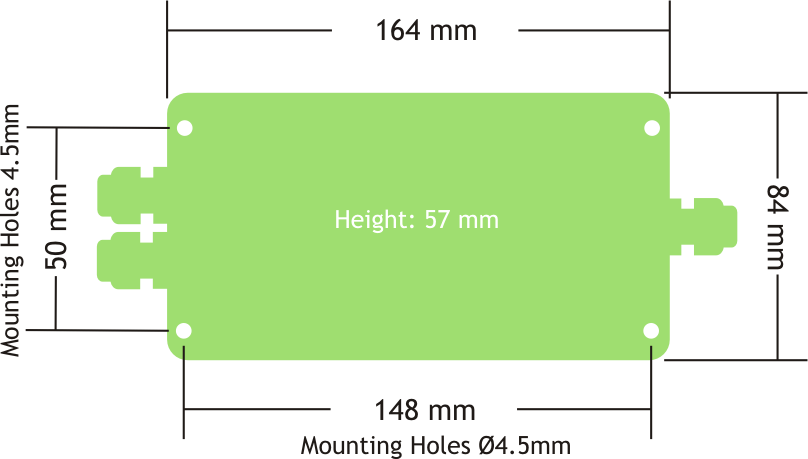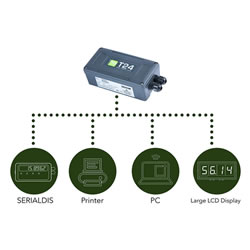T24-SO | Wireless Receiver | Data-Port for Display or Printer
- Radio telemetry serial ASCII output gateway
- User definable serial ASCII output
- Wireless sensor range of up to 800 m (2,600 ft)
- Simple configuration and calibration
- Drives displays, feeds data to loggers, printers, computers etc
- Surface mounting enclosure waterproof to IP67
The wireless receiver with data port for display or printer module generates a serial output ASCII string which can include data from up to 8 x radio telemetry T24 transmitters as well as optionally sum them. The output is suitable for connecting to many serial input devices that require simple ASCII data.
The actual ASCII output can be designed by the user which can include free text or tokens which can represent real data. i.e. <V1> would be the value from input module 1 when the output is triggered.
The output of the T24-SO can be triggered by the reception of user specified data. i.e. data is only outputted when data is received from a specific acquisition module or when triggered from a handheld device.
The license free 2.4 GHz direct sequence spread spectrum (DSSS) radio technology offers high integrity, error free communications which can co-exist with other wireless technologies such as Wi-Fi, Bluetooth® and Zigbee®. FCC, ETSI and IC approvals.
The wireless receiver with data port for display or printer module is configured using free T24 Toolkit software which runs on a PC connected to a T24 base station.
Internal antenna offers up to 800 m (2,600 ft) range in an open field site.
*Maximum range achieved in open field site at height of 3 meters (9.8 feet) above ground.

Documents
- T24-S0 Product Sheet : Wireless Data Relay Module
- T24 Telemetry User Manual : T24 Wireless Telemetry User Manual (8.3 MB)
- Bluetooth Enabling T24 Modules : Describes how to use an LM Technologies LM048 Bluetooth RS232 Adapter to connect T24-BSi, T24-GW1 and T24-SO modules via Bluetooth.
Software
- T24 Toolkit : Version 2.4.8 This toolkit allows configuration, calibration and testing of the T24 range of 2.4GHz telemetry products.
- Q: What does the serial output provide?
-
A: The serial output provides an ASCII string output of up to 8 values in a user formatted string.
- Q: How can I display data using the T24-SO?
-
A: By combining the T24-SO with a serial display such as Mantracourt’s SerialDis unit a display can be created that updates as often the transmitter module transmits data.
- Q: What is the difference between the T24-SO Serial Output and T24 Base Stations?
-
A: The T24-SO gathers data from up to 8 transmitter modules and, on its serial output, provides a user configurable ASCII string. The output string can contain the summed value of the gathered data. This output can be used to drive serial displays, printers or to simply feed directly into a PC, PLC or other data transmitter systems.
The base stations communicate bi-directionally so are used to configure the devices as well as gather data. The communications protocol is binary and packet based and so requires processing to present the data to the application in a formatted manner.

